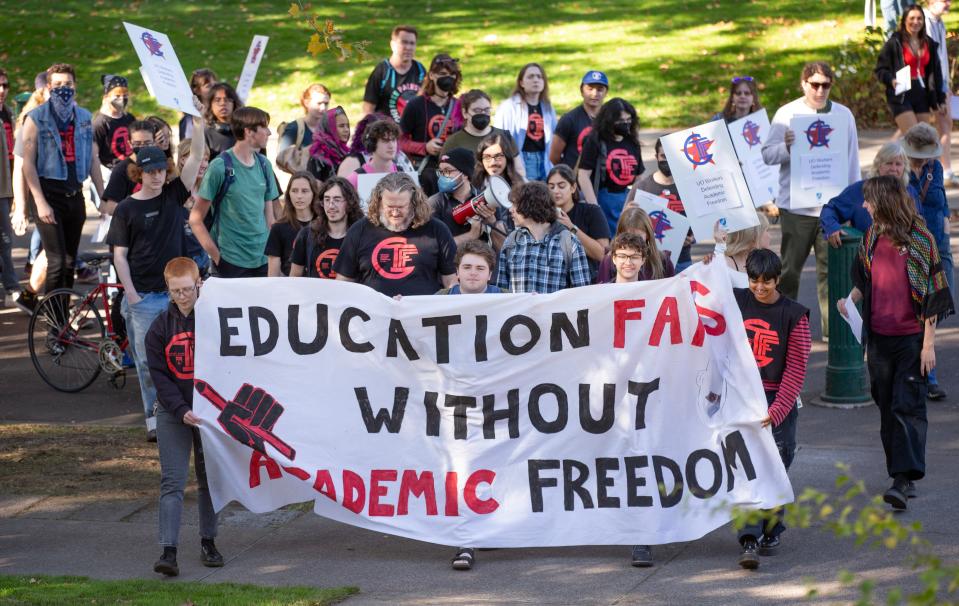University of Oregon unions rallied and marched through campus on Thursday to protest new “free speech policies” recently communicated to staff and faculty.
The UO Campus Labor Council organized a rally in front of the Lillis Business Complex, then marched to Johnson Hall, the university’s administrative building, to deliver a joint “letter of condemnation” to UO President Karl Scholz asserting their right to free speech and expression. The CLC consists of four campus unions: United Academics, Graduate Teaching Fellows Federation, SEIU Local 503 and UO Student Workers. Combined, the unions represent over 8,000 workers on campus.
“This is over academic freedom, the ability to freely express ourselves and express our free speech,” said Collin Heatley, vice president of external relations for GTFF. “The university has increased surveillance of faculty, graduate student workers, undergraduates and undergraduate student workers, and by extension of staff.”

The call for free expression comes after a string of “increased surveillance,” according to union members. Multiple students have been served Student Code of Conduct violations, beginning earlier this summer for their conduct during pro-Palestinian protests in spring. Heatley said additional violations were still being issued as recently as last week. Some of the students who were issued violations were identified through Board of Trustees public comment, in which students are required to give their names to speak to the board.
The policies encourage students to report faculty who may violate UO policies, Heatley said.
“No student should be encouraged or compelled by UO employees to be exposed to the protest or encampment,” stated Interim Vice President for Student Life Kris Winters in May. “This includes visiting the encampment for any academic or instructional purpose including class or office hours. I encourage students to reach out to report concerns.”
The guidelines outline what is and isn’t permitted when students and faculty express themselves. For example “assembling peacefully,” “participating in meaningful discussion” and “distributing flyers and brochures” are allowed, but “exceeding safe occupancy capacity in a room,” “interfering with scheduled university activities,” “camping, vandalizing property or erecting any structures,” and “using any sound, amplified or not, without authorization or outside of the designated times and areas” are not allowed.
The protestors printed out copies of the guidelines and graded them with an “F” in red ink.
“This is one more step down a really troubling and problematic path,” Heatley said. “No matter how you feel about the reasons for the people that are expressing their speech, it matters that that right to do so is protected.”
Following a short rally with speeches from union leaders, the group marched to Johnson Hall.
While the group rallied outside Johnson Hall, the four presidents of each union went inside to hand-deliver their letter to Scholz. Instead, they were met by a member of the UO administration, Mark Schmelz, chief human resources officer and vice president, who discussed their concerns with them.

“We really had hoped that the president would be present to take that letter,” SEIU Local 503 President Jennifer Smith said. “He had a proxy accept that letter, who was quite gracious and accepting, but we did request that the president meet with us so we can share our concerns and work something out.
“I really do feel like these policies are coming from a place of fear, and it’s unfortunate that it seems like this campus is afraid of its own students, who are by and large between the ages of 18 and 22,” Smith said.
Smith said that while the previous actions and policies related to free expression on campus haven’t yet threatened classified employees directly, she said these guidelines could be “selectively implemented” for any type of organizing.
“They are contrary to the free ability to organize our own employees and to organize for better working conditions,” Smith said. “Our ticket just hasn’t come up yet.”
University of Oregon responds to protest
UO provided a statement in response to Thursday’s protest.
“Free expression is fundamental to citizenship and academic life,” UO stated via email. “Equally vital is the right to work and study free from discrimination or harassment. The University of Oregon upholds free expression and academic freedom as essential to our mission, while also fostering an inclusive and respectful campus.”
UO pointed to its policies that ensure all students and staff can exercise their rights while protecting university operations and ensuring safety.
UO’s new website, “Free Expression at UO,” which launched in May, provides information, resources and guidelines on UO expectations for students, staff and faculty.
“All enrolled students are accountable to the UO Student Conduct Code, which establishes community standards to maintain and protect an environment conducive to learning,” UO stated. “Visitors to campus are also held to the Proscribed Conduct policy, which prohibits disrupting teaching and learning activities and unauthorized entry or use of university facilities. These apply to an individual’s actions, not the content of their speech.”
Miranda Cyr reports on education for The Register-Guard. You can contact her at mcyr@registerguard.com or find her on Twitter @mirandabcyr.
This article originally appeared on Register-Guard: University of Oregon students, employees rally over repressed free expression
EMEA Tribune is not involved in this news article, it is taken from our partners and or from the News Agencies. Copyright and Credit go to the News Agencies, email news@emeatribune.com Follow our WhatsApp verified Channel




